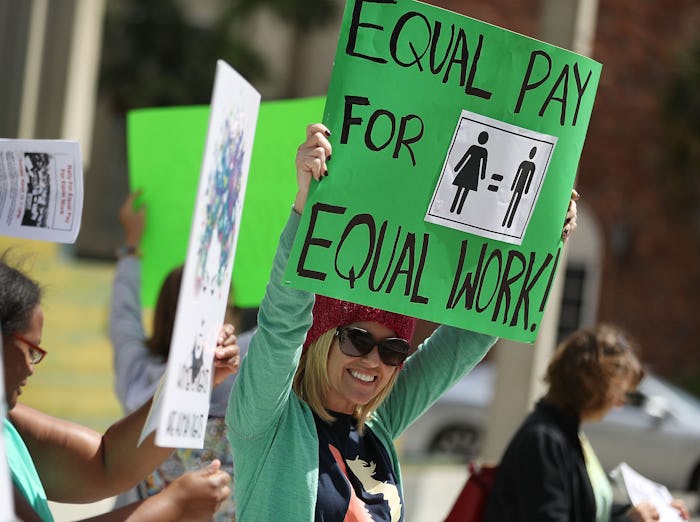Life

Equal Pay Day For Moms Isn't Until Next Month
Tuesday marks the day known as Equal Pay Day in the United States, representing the days a woman must work to earn the equivalent wages that a man worked for the entire previous year. April 4 marks the 94th day in the year 2017, meaning that at the current wage gap, it takes women an extra 94 days to earn the equivalent year's wages of their male counterparts in the American workforce. But if you're a working mom, you'll have to wait a little longer to "celebrate" equal pay. When is Equal Pay Day for moms this year? Working mothers must wait until the end of May this year, when Mothers' Equal Pay Day falls on May 23, according to the The American Association of University Women.
The good news? Equal Pay Day is earlier than it was last year, when it fell on April 16. Unfortunately for moms, Mothers' Equal Pay Day has been pushed back a full week since 2016, when Equal Pay Day for moms fell on May 16. So why is it that working moms have to work even longer than their male colleagues to earn the equivalent wages?
Working moms can thank what's dubbed the "motherhood penalty" — while working dads get a "fatherhood bonus." It's a frustrating paradox in the American workforce that exemplifies backward attitudes about what makes a good worker: If you're a working mom, the prevalence of the motherhood penalty tells these women they're just not as good as working dads, often because they are expected to take more time off to "deal with" situations related to their children.
Women are often seen as the primary caregivers for children, despite a woman's status within the workforce and even with the rise of stay-at-home dads. According to a 2016 Pew Research Center survey, fewer fathers are the sole breadwinners in their households. And yet, workplace biases against mothers still exist, as The New York Times noted in 2014:
Mothers are less likely to be hired for jobs, to be perceived as competent at work or to be paid as much as their male colleagues with the same qualifications.
Men, on the other hand, get a workplace boost from being dads — the "fatherhood bonus." Not only are men with children hired more than male peers without children, dads are more likely to be paid more after they have children. A 2014 study from the University of Massachusetts found that men earn 6 percent more when they become fathers. But if you're a working mom, the stats shift in the other direction: A woman will lose 4 percent in her earnings for every child she has. Even women without any children still face the motherhood penalty.
What's more alarming still is that Mothers' Equal Pay Day doesn't even take into account if you're a working mother who isn't white. If you're an Asian American, Black, Native American, or Latina working woman, your Equal Pay Days don't occur until March 7, July 31, Sept. 25, and Nov. 2, respectively — and these Equal Pay Days by race still don't account for the double whammy of being a mother of a minority race.
Yes, it's important that the American workforce takes time to observe Equal Pay Day on Tuesday — and again next month for Mothers' Equal Pay Day on May 23. But of course, this day — and everything associated with the motherhood penalty — isn't exactly a holiday, anyway. And women shouldn't have to wait until 2059 for the gender wage gap to close entirely. That's right: If the rate of American wages for men and women stays just the way it is, it's going to take another 42 years to erase Equal Pay Day from the calendar entirely.
On this Equal Pay Day — as it is every day of the year — it's time for equal pay now.